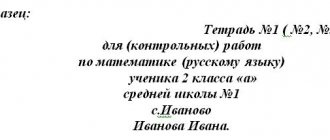File Catalog
Copying is permitted only if you provide a direct link to the material and retain the authorship.
| Home » Files » Competitions 2012-2016 academic year » All-Russian competition “Modern Lesson” |
Russian language lesson in 9th grade “Basic types of complex sentences”
| [ (960.2 Kb) ] | 24.02.2014, 19:35 |
| Author - Tatyana Vasilievna Pavlova Educational institution - Municipal Educational Institution "Neverovskaya Secondary School" of the Tavrichesky District, Omsk Region Subject - Russian language Topic: "Basic types of complex sentences." Grade - ninth Educational and methodological support: “Russian language: Textbook. for 9th grade. general education institutions / S.G. Barkhudarov, S.E. Kryuchkov, L.Yu. Maksimov and others - M.: “Prosveshchenie”, 2010.” Purpose of the lesson: to give a general idea of the main types of complex sentences and the methods of connection between them. Objectives of the lesson: Educational: to consolidate the ability to distinguish a simple sentence from a complex one, put punctuation marks in a complex sentence; teach to distinguish complex, compound, non-union sentences; repeat coordinating and subordinating conjunctions, Developing Develop skills in working with the algorithm, oral and written communication skills, and ICT skills. Continue working on developing logical thinking; contribute to the development of students’ abilities and skills to obtain knowledge, systematize and apply it in practice. Educational Cultivating love for the native language; nurturing a culture of intellectual work, developing the ability to feel the beauty of words through working with text, cultivating in students a true understanding of kindness, the desire to act kindly, to be caring towards people. Planned (final) results: knowledge of the main types of complex sentences, the main ways of connecting simple sentences in complex; the ability to distinguish simple sentences with various types of isolation from complex ones, to distinguish complex, compound, non-conjunct sentences. The leading forms, methods and techniques of the lesson are conversation, search method, text research, putting forward a version of the study, expert analysis. Lesson type: lesson on learning new material. Type of lesson: combined. Equipment: Power Point presentation, multimedia projector, textbook, notebooks. During the classes. I. Organizational moment. Greetings. Teacher: Hello, guys! I am glad to welcome you to the Russian language lesson. I hope that our feelings are mutual. Let's smile at each other and mentally wish each other good luck. I believe that everything will work out today. We're ready to go. II. Updating knowledge. 1. What sentence did we talk about in the last lesson? How is it different from complex? What needs to be done to determine whether the sentence before us is simple or complex? Where do we start analyzing the proposal? 2. Correct. The very first thing we must do is highlight the grammatical basis of the sentence. Let's practice this now. To do this, we will perform oral syntactic calculation. I offer you proposals, and you find and consider the basics in them. Slide 1. Oral syntactic counting Teacher: As you can see, simple sentences are not so simple, and complex sentences are not so difficult, if you know well what they are. Why are complex sentences needed? Why is it impossible to use only simple sentences? Or combine them all into complex ones? What is a complex sentence? What types can it be divided into? How to distinguish one type of complex sentence from another? You will learn about all this in class and will be able to answer the questions asked. If you complete all the exercises and tasks, you will feel more confident. If you were paying attention just now, you can determine the topic of today's lesson. How can we define it? Slide 2. Main types of complex sentences Write down the numbers and topics of the lesson in notebooks. III. New topic. 1. Now let's analyze a few proposals. Let's not limit ourselves to just highlighting the basics. Let us pay attention to how simple sentences are connected to each other in a complex one. Is there any connection between them? Or is it just a mechanical merging of simple sentences. And if it exists, then by what means is it expressed? So let's get started. For analysis, I took statements from famous people. Here they are. Slide 3. Analysis of proposals A) All good things are cheap, all bad things are very expensive. (Thoreau) - How do you understand the meaning of the saying? — Let’s define the boundaries of the proposals. - What is the connection between these proposals? - How is this connection expressed? B) The setting in which the gem is set increases its price, but not its value. (Burns) - How do you understand the meaning of the saying? — Let’s define the boundaries of the proposals. - What is the connection between these proposals? - How is this connection expressed? Q) Behavior is a mirror in which everyone shows his own appearance (Goethe) - How do you understand the meaning of the saying? — Let’s define the boundaries of the proposals. - What is the connection between these proposals? - How is this connection expressed? D) If we ourselves had no shortcomings at all, we would not notice them with such pleasure in others (La Rochefoucauld) - How do you understand the meaning of the saying? — Let’s define the boundaries of the proposals. - What is the connection between these proposals? - How is this connection expressed? D) Arrows pierce the flesh, and evil words pierce the soul. (Gracian) - How do you understand the meaning of the saying? — Let’s define the boundaries of the proposals. - What is the connection between these proposals? - How is this connection expressed? — What unites all these statements? - How are simple sentences related to each other? — Is a complex sentence a simple mechanical connection of simple sentences? Or are there semantic relationships between them? Which? How are they expressed? — What is expressed in complex sentences using conjunctions and intonation? Conclusion: A complex sentence differs from a simple one in the number of grammatical elements. A simple sentence has one grammatical basis, a complex sentence has two or more. But two simple sentences are not the same as a complex one consisting of the same simple ones. A semantic and intonational connection arises between simple sentences in complex ones. There is more information in a complex sentence than in two simple ones 2. Reading a textbook (p. 20, paragraph 1, paragraph 2) - How are simple sentences combined into a complex one? — By what means are semantic relations expressed in complex sentences? - Slide 4. Means of conveying semantic relations in complex sentences. 3. – What are the names of complex sentences in which semantic relationships are expressed using intonation? — What are the names of complex sentences in which semantic relationships are expressed using conjunctions and allied words? Slide5. Complex sentences: Union and non-union - Let's get acquainted with the statement of M.V. Lomonosov about unions. - Who is Lomonosov? In what areas of knowledge did he leave his mark? — What important feature of unions does Lomonosov notice? 4. Reading the textbook (p. 20) Slide 6. Conjunctive sentences. SPP and SSP - What are the names of sentences in which simple ones are connected using coordinating conjunctions? — What are the names of complex sentences in which simple ones are connected using subordinating conjunctions and allied words? GYMNASTICS FOR THE EYES slide 7. IV. Consolidation. 1. What did we learn about complex sentences in class today? Slide 11. 2. How to determine the type of proposal? Slide 12. Introduction to the work algorithm 3. Exercise 52 (orally along the chain) V. Individual work using cards VI. Reflection. What did you learn about in class today? What did you find difficult? What was easy to do? What was interesting? What should you think about? VII. Homework. Slide 18 | |
| Category: All-Russian competition “Modern Lesson” | Added by: pava144 | |
| Views: 5734 | Downloads: 707 | Rating: 0.0 / 0 | |
| Total comments: 0 | |
Add comments can only registered users. [Registration | Entrance ]


